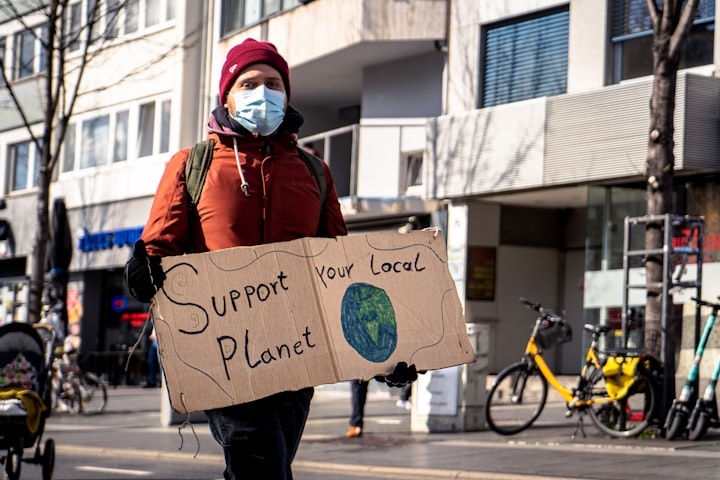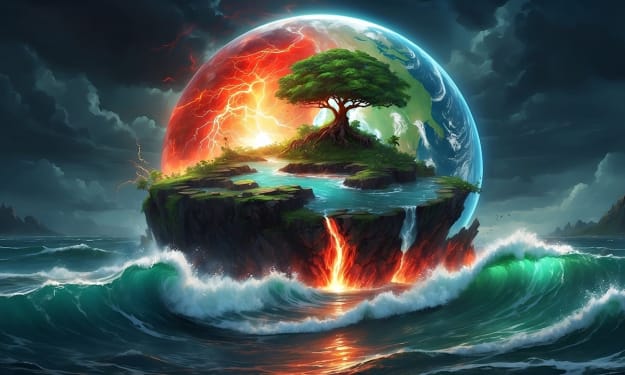Environment is polluted day after day
Pollution

Since the 19th century, water and air pollution from solid waste have been a problem, especially in densely populated urban areas. Water pollution increased during the beginning of the Industrial Revolution, when industries began to discharge pollution into rivers and streams. In 1969, chemical waste dumped into the Cuyahoga River in Ohio caused a river to burst into flames, and it became a symbol of how industrial pollution was destroying.
The dramatic technological advances of the Industrial Revolution in the mid-nineteenth century led to new sources of air and water pollution. The emergence of high industrial use and bulk of coal has led to unprecedented air pollution, while large amounts of industrial chemicals add to the growing burden of untreated human waste. Air pollution has been a problem in the country since the Industrial Revolution, which dates back to the 1952 Great Smog.
From about 1000 AD the use of coal as fuel created significant air pollution and the conversion of coal into a smelting coke in the early 17th century exacerbated the problem. During the Great Smog of 1952, at least 4,000 people died in London in a few days from pollutants mixed with heat from factories and chimneys.
Over the next few decades, as air pollution research continues, public health concerns spread to heart disease, diabetes, obesity, birth defects, vascular disorders, and immune system disorders. Air pollution is now a major environmental risk of premature death and causes over six million premature deaths from heart disease, stroke, diabetes and respiratory diseases each year. A study published in The Lancet Commission on Pollution and Health in October 2017 found that global pollution of toxic air, water, soil, and jobs kills nearly nine million people a year, double the number of deaths such as AIDS, tuberculosis, and malaria combined. , and 1.5 times more deaths from war and other forms of human violence.
Studies suggest that prolonged exposure to pollutants increases the risk of emphysema more than smoking a pack of cigarettes a day. Children, the elderly, people with existing diseases, small communities and low-income communities are at greater risk of adverse health outcomes and economic impacts such as working days not being held due to air pollution. Climate change is expected to continue to wreak havoc on human health with increasing levels of ozone depletion and pollution in some areas.
The impact of air pollution on human health varies with pollution, said Hugh Sealy, a professor and director of Environmental and Occupational Health Track at the Department of Public Health and Preventive Medicine. Georges University in St Georgia. Air pollution levels beyond the organisation's air quality standards can affect people's health, including levels found in other parts of.
Air pollution occurs in the form of greenhouse gases such as carbon dioxide and sulfur dioxide that heat the planet as a result of global warming. Fuel (oil and natural gas) for heating and household products, production, electricity generation (eg coal-fired power stations) and emissions from chemical production are the main sources of man-made air pollution. Fungi and other organisms that cause allergies from trees, weeds and grass are carried to the air, which exacerbates climate change and poses a health risk.
The solid and liquid particles of certain gases that float in the air come from cars and trucks, factory dust, pollen, mold particles, volcanoes, and forest fires. Vehicle extraction vehicle, chemicals and factory dust and pollen and mold particles suspended particles. These particles absorb air and form chemical and air reactions such as aerosols. Display Source Documents
These solid, liquid particles and certain gases floating in the air are not good for our planet and our health, so it is important that you take care of them.
Particles and gases can come from many sources including car explosions, industries, wildfires, and other forms of chemical reactions in air. Nutritional pollution, also known as eutrophication, is a type of water pollution. Water is polluted with nutrients such as nitrogen.
Pollution is the process of polluting the soil, water, air and other parts of the environment or making them unsafe or ready for use. Pesticides, medicines, metals and other toxic pollutants can harm human health and affect the survival, growth and reproduction of fish and wildlife. Toxic pollutants found in kidneys, tissues, fish and other organisms enter water and air through contaminants from agricultural runoff.
The process of polluting the soil, water, air, or other parts of the environment and making them unsafe or ready for use is done by putting pollution into the natural environment, but pollution does not have to be visible.
Cleaning can be minimized by procedures such as reuse and proper handling of water and toxic wastes. Policies and investments that support integrated policies that promote sustainable land use, clean energy and housing, energy efficient housing, electricity and industrial production and better municipal waste management can reduce major sources of air pollution.
The analytical work can help raise awareness of the seriousness of air pollution and its impact on human health, identify cost-effective interventions to reduce outside air pollution and create opportunities to strengthen institutional air quality management structures. In addition, interventions can be put in place to reduce air pollution by working to address the link between pollution, health, and climate risk.





Comments
There are no comments for this story
Be the first to respond and start the conversation.